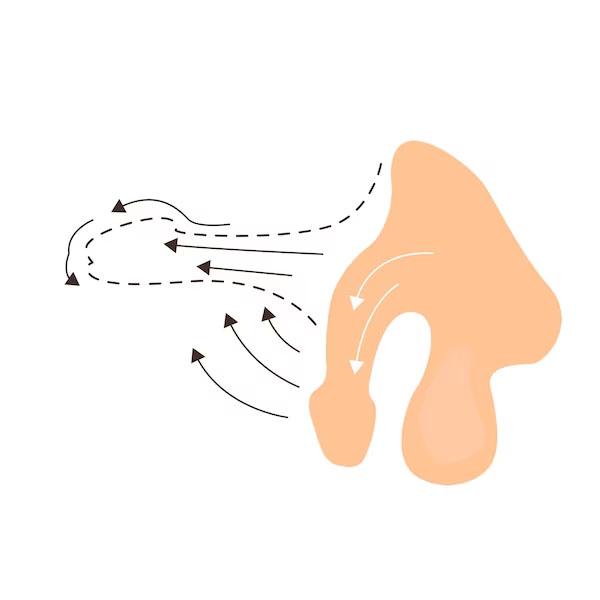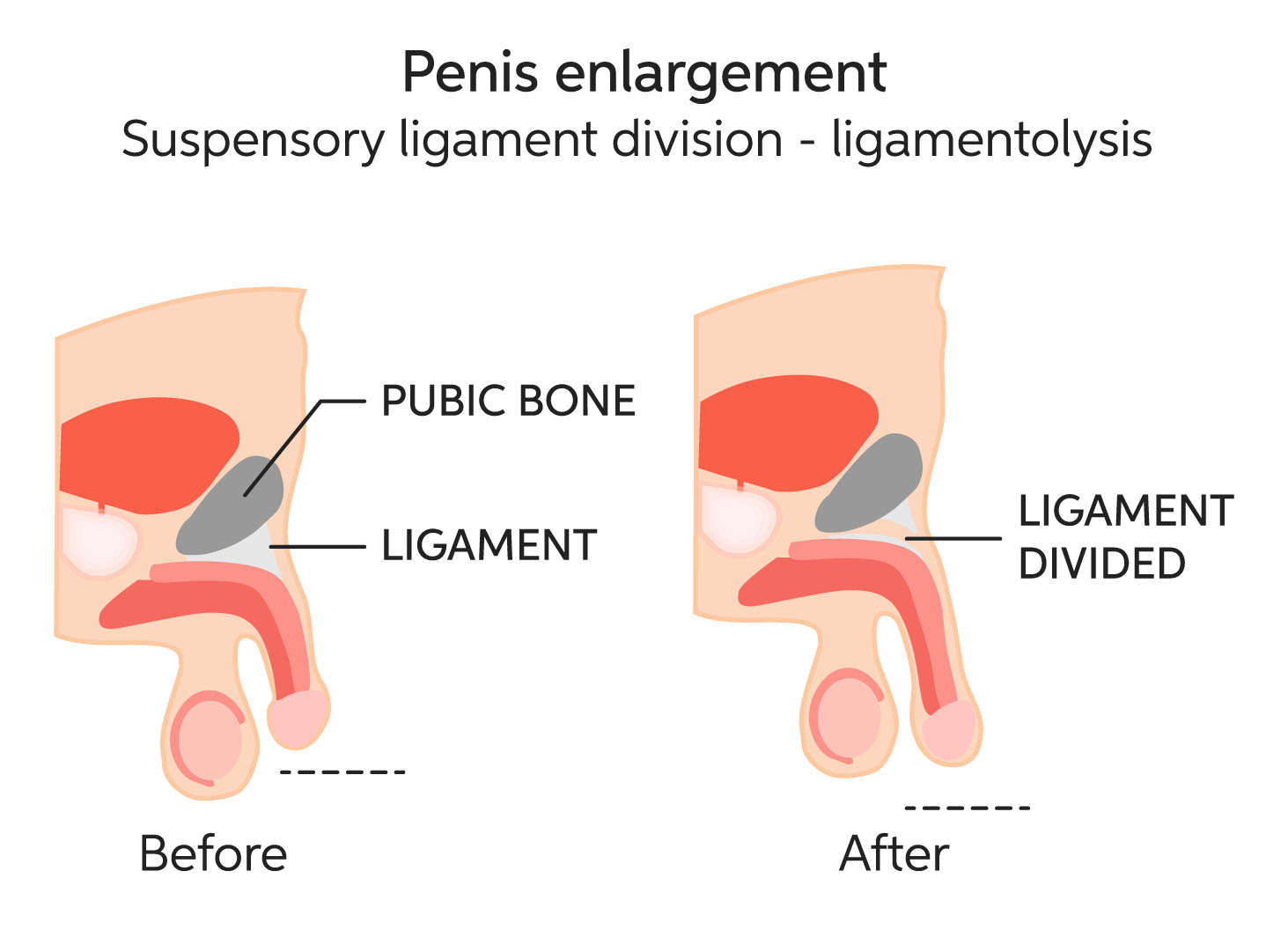Penile Enlargenment

Concerns regarding penis size often revolve around how one perceives their own body, but certain individuals may choose to pursue surgical options to enhance the size of their penis. Such procedures come with inherent risks, including the possibility of infections and scarring. However, it is essential to remember that each person's decision regarding such matters should be respected, and seeking professional medical advice is crucial before opting for any surgical intervention.
What is Penile Enlargement Surgery?
Penile enlargement surgery aims to enhance the appearance of the penis by offering different procedures. These techniques can include:

- Lengthening surgery, which focuses on increasing the length of the penis.
- Widening surgery, which aims to increase the girth or circumference around the shaft of the penis.
- Additionally, some individuals may opt for liposuction procedures to reduce stomach fat, which can make the penis appear larger in comparison.
It's important to understand that such surgical interventions should be carefully considered, as they carry potential risks and complications. Before deciding on any procedure, it is crucial to seek advice from qualified medical professionals who can provide accurate information and guidance tailored to individual needs and circumstances. Ultimately, making informed decisions about any form of surgery is crucial to ensuring overall health and well-being.
How is the Penile Enlargement Surgery done?
Penis enlargement surgery is a medical procedure aimed at increasing the size of the penis, either in terms of length or girth.
The surgical techniques employed may involve:

- Insertion of silicone implants, where a crescent-shaped piece of medical-grade silicone is inserted beneath the penile skin to increase both length and width. Currently, the Penuma procedure stands as the sole FDA-approved surgery for commercial use under the 510(k) regulation. In this procedure, a surgeon creates an incision above the penis and inserts a customized silicone implant onto the shaft, ensuring it fits the penis's size and shape.
- Fat cell transfer, wherein a surgeon removes fat cells from a fatty area of the body and injects them into the penile shaft through small incisions.
- Suspensory ligament division surgery, also known as ligamentolysis, offers a way to visually enhance the flaccid penis's length by cutting the suspensory ligament that attaches the penis to the pubic bone. This procedure allows the flaccid penis to hang further down, but it does not actually increase its size.
In some cases, cosmetic procedures may be utilized to create the appearance of a longer penis.
However, it is essential to understand that genuine medical indications for penis enlargement are relatively rare. According to the Urology Care Foundation (UCF), surgery is typically only considered necessary when a condition called micropenis is diagnosed. Micropenis is defined as a penis that measures 7.5 centimeters or less when stretched.
For most individuals, a penis that functions adequately for both sexual intercourse and urination does not require surgical intervention.
Less common augmentations include tissue grafts, hyaluronic acid injections, polylactic acid injections, and penile disassembly.
Benefits and Risks of Penile Enlargement Surgery
Certain procedures for penis enlargement have been reported to lead to increases in both penis length and girth. It is essential to approach these procedures with realistic goals and expectations, as doing so can contribute to increased confidence and self-assurance post-surgery.
By setting reasonable expectations and discussing your desires with a qualified medical professional, you can gain a better understanding of the potential outcomes and limitations of the chosen procedure.
Undergoing penis enlargement procedures comes with several potential risks or drawbacks, including:
- Adverse reactions to anaesthesia.
- The possibility of scarring or experiencing an inflammatory reaction.
- The need for additional surgery, which may inadvertently result in a shorter penis.
- Developing a bend or kink in the new shape of the penis due to scarring.
- Experiencing a loss of sensation or encountering pain in the penis.
- The risk of developing erectile dysfunction.
- Increased susceptibility to infections.
The potential for dissatisfaction with the results, wherein the achieved size may not meet the initial expectations.
It is essential to thoroughly assess and understand these risks before deciding on any procedure. Consulting with skilled and experienced medical professionals can help you make informed choices about the best course of action based on your specific needs and goals.
Are there any non- surgical ways to get Penile Enlargement done?
It is crucial to exercise caution and seek professional guidance before using lotions, creams, or devices on your penis. Most of these "treatments" have not been scientifically proven to be effective and, in some cases, can be potentially dangerous. Using unapproved methods, such as weights to increase penis length, can lead to harmful consequences and damage the penis.
Some of the remedies people may consider for penis enlargement include:
Testosterone replacement therapy, which is primarily used in children with micropenis due to low hormone levels. It can be administered in various forms like oral, buccal, intramuscular shots, transdermal patches, subdermal (under the skin), and nasal preparations.
- Creams or lotions specifically marketed for penis enlargement.
- Supplements claiming to enhance penis size.
- Penile traction devices, sometimes used before and after surgical procedures.
- Weights, which are employed by some individuals in attempts to lengthen their penis.
Before trying any of these remedies, it is vital to have an in-depth discussion with your healthcare provider. They can provide expert advice, assess your specific situation, and guide you on the best course of action. Many of these products have not been thoroughly evaluated for safety and effectiveness, so relying on health experts' recommendations is crucial to protect your well-being.
How much does penile enlargement surgery cost in India?
Penile Enlargement surgery cost in India typically commences at ₹110,000. The actual cost of such surgeries may vary across different hospitals and centres, influenced by various factors. On average, individuals may expect to pay around ₹145,000 for Penis Enlargement, while the price range can extend up to ₹180,000.
It is essential to recognize that the cost can differ based on factors such as the medical facility's reputation, the surgeon's experience, the specific procedure chosen, and the level of complexity involved in the surgery. Prior to deciding on any Penis Enlargement surgery, individuals should carefully consider these aspects and consult with medical professionals to fully understand the associated costs and potential outcomes. Making an informed decision will help ensure a safe and satisfactory experience throughout the procedure.
Frequently Asked Questions:
Yes, there are non-surgical methods available for penis enlargement. Some individuals may opt for penis pumps, which use vacuum pressure to temporarily increase blood flow and achieve a firmer erection. Additionally, there are exercises, like Kegel exercises and jelqing, which focus on strengthening the pelvic floor muscles and improving blood circulation to the penis. However, it is essential to note that non-surgical methods may have limited effectiveness and vary in results from person to person.
Yes, undergoing penis enlargement procedures can have psychological effects on some individuals. While some may experience increased confidence and self-assurance after achieving their desired results, others may face feelings of disappointment or dissatisfaction if the outcomes do not meet their expectations. It is crucial to have realistic expectations and consult with mental health professionals if needed, to address any emotional concerns before and after the procedure.
Penis enlargement surgery is primarily aimed at enhancing the size or appearance of the penis and may not directly impact sexual performance. While some individuals may feel more confident in their sexual abilities following the surgery, the procedure itself may not guarantee improved sexual performance. For addressing issues related to sexual function, it is best to discuss concerns with a healthcare provider or seek appropriate treatments specific to the condition.
Age restrictions for penis enlargement procedures can vary depending on the type of surgery and the medical provider's policies. In general, most surgeons recommend that individuals be at least 18 years old before considering such procedures. Additionally, age-related health factors may be taken into account to assess an individual's candidacy for the surgery.
Yes, there are non-permanent alternatives to penis enlargement surgery. For individuals seeking temporary enhancements, there are products like penis extenders or sleeves that can be used during sexual activity to add length or girth. However, it's essential to remember that these non-permanent solutions only provide a temporary visual effect and do not permanently change the penis size. Consulting with a healthcare provider can help determine the most suitable options based on individual preferences and goals.
Procedure Time:
- 2-5 hours
Full Recovery:
- 6 weeks
Anaesthetic:
• General
Back to work:
• After 2 weeks
Duration of results:
• Permanent
Results:
• Noticeable within 2 weeks
Temporary risks & complications:
• May include soreness, bleeding, persistent pain, and infection
• *Individual results and reactions may vary.
